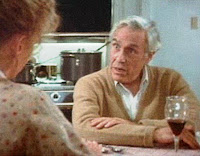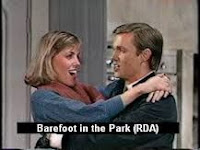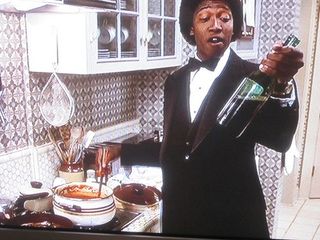I remember when I first went to see Biloxi Blues in its original theatrical release back in 1988, and having low expectations for the experience. Not that I wasn’t a fan of its writer, Neil Simon, but I just didn’t see how a “Part II” of a trilogy, and a service comedy at that, could be counted among the writers more accomplished works. I mean, you pretty much habe al the clichés: raw, rookie recruits, the hard-ass drill sergeant, the character evolutions, the pat ending, etc. But damned if Simon doesn’t yet again come out with another winner – a winning story with smart dialogue that transcends its form, giving as several hearty laughs and at least two memorable lump-in-the-throat moments.
Eugene Morris Jerome (now played by Broderick, portrayer of
the character on Broadway in this and Brighton
Beach Memoirs), is eight years older and a U.S. Army draftee on the way to
basic training in Biloxi, Mississippi. It is mid 1945, during the last months
of WWII, and he and all his fellow recruits are as nervous as hell. Their
anxiety isn’t exactly helped by their introduction to their new drill sergeant,
a man named Merwin Toomey (what a name!), who can best be described as
eccentric – he dispenses discipline with the best of the regular army regulars
but has a quirky intellectualism too; he knows intuitively exactly what his
men’s strengths and weaknesses are, and how best to exploit them for his
advantage.
Jerome continues to write daily in his journal, observing
his fellow recruits. One in particular fascinates him, a fellow Jew named
Epstein, but he quickly becomes the butt of everyone else’s jokes – and isn’t
exactly a hit with Toomey either, especially when his lesson in security
backfires after Epstein returns money to a careless soldier – money taken by
Toomey to prove a point. And whe Eugene’s journal is seized and read aloud by
the others, his suspicion of Epstein as a homosexual proves all the more
damaging after a man gets arrested for sodomy and his partner gets away,
unknown. The other man is eventually caught, but the camaraderie among the me
is still tenous at best. Only a 48-hour pass helps alleviate tensions,
particularly for Eugene, who manages to lose his virginity and fall in love on
the same day (with different women).
But Toomey seems to become more and more unhinged, and he
shows up drunk at the barracks, threatening to kill Eugene with a loaded
pistol. Eugene bravely takes his place, and we learn Toomey derangement may be
exacerbated by his imminent reassignment and despair that he’s never really
turned a grunt into a efficient killing machine. The other unit members return;
Toomey, expecting to be court marshaled, is granted amnesty by all, and
administered punishment by Epstein: 200 push-ups, just like he wished for in a
game where all the men had to reveal their fantasies. WWII ends with most privates
returning home, without seeing any action, but Jerome still recalls it as the
best time of his life.
There’s a hell of a lot to like here, and most of it,
expectedly, involves the scenes between the recruits in the barracks. Yes, we
get the standard army conventions, but with a twist – and of course, class-A
dialogue. It’s a tall order to write smart for characters we generally know to
be pretty plain rhetoricians, but Simon pulls it off by wring smart basic dialogue for most of the
men, except Eugene and Toomey (who gets away with it because his hoity talk is
sort of a twist on the bellowing, barking commander).
And the scenes these lines serve are well-developed, with at
least three standing out as wonderful. There’s the moment when Eugene plays a
game with the men, in which all of them must reveal what they’d do with their
last week on earth. Another involves the aforementioned stealing of Eugene’s
diary, what gets revealed, and the men’s often surprising reactions to hearing
it. And the final payoff is beautiful, with Toomey crashing – and his
redemption in the eyes of the men he trained. What helps makes these scenes
work so well is, in part, their unpredictability. They straddle the line
between credibility and genuine theatrical surprise – two elements that are not
mutually exclusive – and ultimately produce a work that has both grit and
pathos.
Credit director Mike Nichols, theatrically trained, for much
of this. He so unsung, so often, because he focuses more on clarity of action,
letting his actors take center stage, not director. As such, many performances
from Nichols films receive the glory – they get to breathe, fully, thanks to
their encapsulating narrative fluidity, Christopher Walken, in particular, is
marvelous; it’s his best work since The
Deer Hunter, and he allows Toomey to be feared, respected and sympathized
with – all in equal measure. Broderick has the thankless role of recorder, but
it’s no less admirable. I found myself watching him watching others, because he
was so convincing as a young Neil Simon.
The love story isn’t bad, either – Daisy Hannigan (who
regrettably, and hilariously, changes her name to something far less poetic as
revealed in the film’s epilogue), is enduringly played by one of my faves,
Peneople Ann Miller, who plays ethereal perfection like a faded photograph cherished
by a reminiscent lover. It’s a fine subplot, but it’s marginal, and
intentionally so: the real relationship drama here is of the men. And Simon is
clearly aware of it too.
And part of the poignancy of the film is what I brought to
it this time. Seeing it now, 27 years later, I was struck more by it war theme
than before. Having recently done some geneology work, I’ve discovered how many
men on my father’s side were affected by the war – two died fighting it, a few
others injured, and many emotionally scarred and were not the same again –
certainly far different by the time I knew them. The scene of the men on the
train reminded me of my grandfather’s diary – on his way to god knows where, being
trained to fight god knows what. And I thought more globally, too- the very
young the first to be called up for our Great War Machine – yet they are the
most impressionable and malleable – easily manipulated and controlled.
Of course, this film has no designs to be a great antiwar
film. But in its snapshot of one man’s experience, it still gave me much to
think about on the subject of war. Simon delves into yet another realm of uncharted territory, and illuminates that much more of the human condition –
through humor, his most potent tool. Just like Eugene.
Stage in Simon’s life: again, pretty obvious.
Rating: ****
























